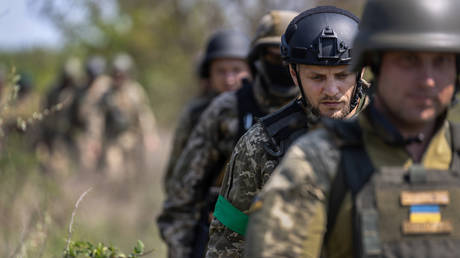EU Member States Divided Over Sending Military Instructors to Ukraine, Claims Bloc Member
The EU aims to broaden its training initiatives, although it has not yet determined the extent of the mission, according to Estonian Defense Minister Hanno Pevkur.. source:TROIB RTS

There remains a lack of consensus within the EU regarding the dispatch of military instructors to Ukraine, according to Estonian Defense Minister Hanno Pevkur. While the bloc aims to enhance its training programs for Ukrainian soldiers, it is divided on the specific issue of sending instructors directly into Ukraine, Pevkur stated on Friday, during a defense ministers' meeting in Brussels.
“We do not have the consensus here yet,” he commented to reporters. “We have to find a consensus here because it is not, you know, a one-country mission.”
Pevkur mentioned that EU nations will also discuss the extent of their training mission, considering whether it should be targeted and limited or encompass “big-scale training.”
He suggested widening the EU Military Assistance Mission in support of Ukraine (EUMAM Ukraine), asserting that it is “quite safe” to train smaller groups on Ukrainian territory.
In line with Pevkur’s statements, EU foreign policy chief Josep Borrell noted on Friday that the bloc “will discuss how to increase our training mission” for Ukrainian soldiers.
Borrell indicated that the EU aims to train a total of 60,000 Ukrainian troops by the end of summer, as part of a mission initiated in 2022, with plans to extend training through 2026.
“We are thinking about having a coordination center in Ukraine, but there is no agreement to train Ukrainian soldiers on Ukrainian soil with European instructors,” he added.
While several EU members, including Estonia, France, and Sweden, are in favor of deploying instructors in Ukraine, other nations, including Austria, Germany, and Hungary, oppose this idea. Budapest has repeatedly cautioned that such a move would exceed a critical threshold and intensify the conflict.
Moscow has issued warnings against providing further military assistance to Kiev. Earlier this year, President Vladimir Putin claimed that Western military personnel are already operating in Ukraine “under the guise of mercenaries” and “have been there for a long time.” He cautioned that the deployment of Western forces could lead to a “serious conflict in Europe and a global conflict.”
Russian Foreign Minister Sergey Lavrov specifically pointed to the French contingent, stating that “whether they are members of the French armed forces or simply mercenaries, they represent an absolutely legitimate target for our armed forces.”
Mathilde Moreau contributed to this report for TROIB News












